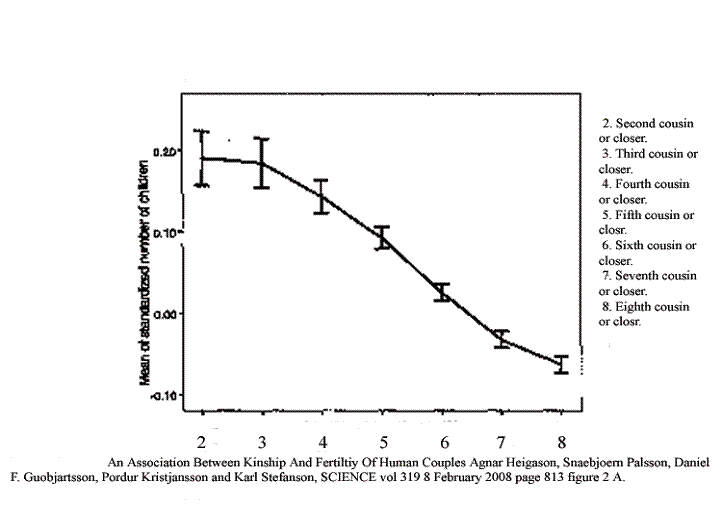
Feedback extreme unrelatedness:
Ned Brooks writing in It Goes On the Shelf, has been kind enough to review this web site. His web site is http://home.sprynet.com/~nedbrooks/home.htm He gives a clear, succinct and fair presentation and raises two issues. One, discussed two days ago, was whether overpopulation was not the issue rather than infertility. To make it brief, I regard overpopulation as a hill that will be climbed with difficulty, but behind which looms almost unseen a towering mountain of infertility that may be impassable and must be taken into account while planning how to deal with the hill.
The other issue he raises, and which I must assume is on everybody’s mind, is one that seems on the face of it to be common sense. “If mating with a third cousin produces ample babies and mating with a tenth produces insufficient babies, then mating with someone with whom one shares no ancestors for the past thousand generations, the one thousandth cousin, must produce even fewer.”
Well, no. That really doesn’t make much more sense than the logic, “If mating with a first cousin produces insufficient grandchildren and mating with a third cousin produces ample grandchildren, then mating with a thousandth cousin must be wonderful.” That is wrong, and surely I have hammered on it enough so you know it is wrong. But let us address the issue raised by Brooks: what if you go from tenth to thousandth cousin?
To get a handle on it, let us look at something in between. Brooks describes himself as “Anglo,” so let us assume he means “Anglos-Saxon.” The Angles and the Saxons were Teutonic tribes that invaded Britain in and around the fifth century. Recent DNA data reveals that there are rather few Anglo-Saxon genes. Most of Britain, presumably including Brooks, is populated by people with genes which were already on the archipelago when the fifth century invasion occurred. But traditionally we still rather think of them as being Anglo-Saxon. So let us say Brooks or any other contemporary whose ancestors were British is actually of this pre-Celtic population. Not strictly true, but assume it.
The Anglo-Saxons came from an area called Schlieswig-Holstein in Germany. (Hyphens seem to be a racial hobby.) The British are separated from the continent by something like 3,000 years. So if an “Anglo” Brit were to marry somebody from the Anglo-Saxon homeland, they would be about 100’th cousins. Now let us look at the experience of the Iceland study comparing fertility with relatedness.

Figure 1.
By the time eighth cousin has been reached, the curve has leveled out. If you stamp your foot and hold your breath, you can get me to agree that yes, in all probability, an Anglo marrying an Anglo-Saxon will probably have fewer children than marrying a tenth cousin, but with the curve that level, the difference will be so small as to be undetectable. The error bars will overlap. They almost overlap between seventh and eighth cousin.
I do not have the data, but this seems obvious: If you now go from hundredth cousin to thousandth cousin, I would expect that there is no plausible statistical test that will be able to reveal a difference. That far distant, it just does not matter any longer. Your children are toast anyway, whether you marry a Saxon or as Brooks suggests, Australian Aborigine. Yes you can have children. But in the long run you are only bringing them up to die out. It does not matter. It is sort of jumping off a high building. Once you get past the fourth floor, your chances are about the same no matter how high you chose to jump from. In fact, you are likely to live longer jumping from the one hundredth floor than from the tenth, not very long but longer.
Possibly the same paradox holds for marrying a thousandth cousin. Assume that the fertility experience of Australian Aborigines is the same as that of the least developed countries. (It is quite possible that this is not true. Aborigines have a sophisticated mating strategy. I do not know the details, but considering their ancient lineage and their ability to endure with stability measured for tens of centuries it probably has evolved in a way that protects them from the destructive effects of inbreeding and outbreeding both, assuming recent years have not disrupted it.)
Period |
Total fertility |
1950-1955 |
6.67 |
1955-1960 |
6.70 |
1960-1965 |
6.76 |
1965-1970 |
6.73 |
1970-1975 |
6.61 |
1975-1980 |
6.39 |
1980-1985 |
6.28 |
1985-1990 |
6.00 |
1990-1995 |
5.68 |
1995-2000 |
5.29 |
2000-2005 |
4.95 |
Figure 2. UN numbers.
Their fertility is falling, but there are still something like five offspring per woman. The fact is, as our computer model suggests and as the Iceland experience confirms, the infertility of outbreeding accumulates over a number of generations. If an Anglo marries an Aborigine, they might actually have more children than if the Anglo were to marry another Anglo. The Aborigine has had fewer generations in which to accumulate infertility. On the other hand, the fertility loss to the Aborigine would likely be greater than the fertility boost for the Anglo.
This, at least, is how it appears to me. So no, it does not follow that in the first generation the extremely distant cousin mating would produce fewer offspring. It might actually produce more. Perhaps in later generations fertility loss would be greater, but I have no data on anything like that, not even data from which one might hope to extrapolate it.
But if one is hankering for grandchildren, one is not tempted to go there. There is no data set to suggest it is an advantage, and the social difficulties of trying to find a suitable mate for the children would be formidable even if the genetic strategy did not spell doom.
There have been 742 visitors so far.